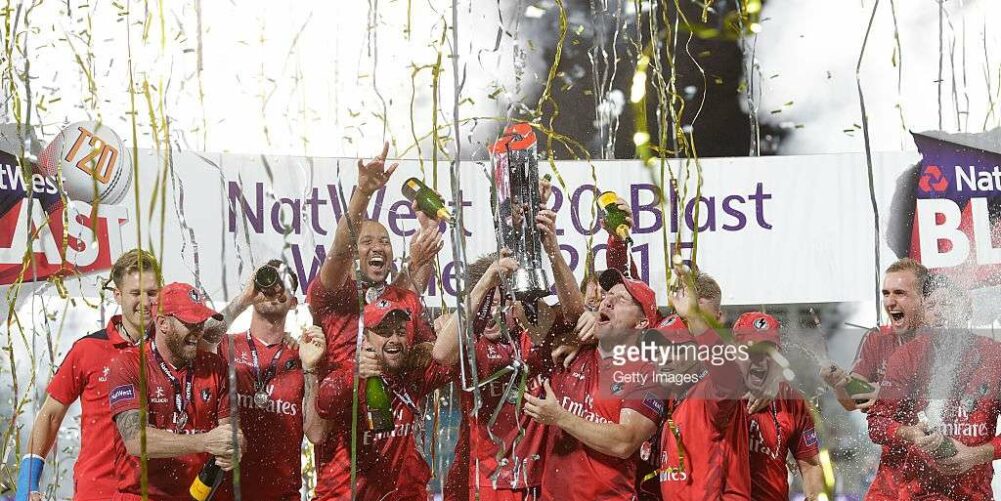Tim Wigmore says there should be two divisions for t20 cricket here, but franchises won’t work
No one likes January; the early starts, the gloom, the cold and the hangover from Christmas. It’s not much fun.
For English cricket fans, January has become the month of envy. As they wake up, bleary-eyed, they put their TVs on and see a spectacle from Down Under to behold: the Big Bash League. Not unreasonably they demand something similar in England, rather than the convoluted t20 tournament we are lumbered with.
Andrew Strauss and Tom Harrison are not immune to such thoughts. Since being appointed as Director of English Cricket and ECB chief executive last year, they have tried to modernise England’s own t20 tournament, the NatWest Blast.
Now a solution seems at hand. On March 7, the ECB board is likely to vote through a change in the competition, advocated by Harrison and Strauss. From 2017, England’s domestic T20 tournament will comprise two divisions of nine, probably with two teams promoted and relegated each season.
To many this is a missed opportunity. The clarion cries to introduce a franchise tournament will not be suppressed by the introduction of two divisions, which some see as nothing better than “a miserable little compromise”, as Nick Clegg once described the Alternative Vote.
Yet, in the rush to decry those who are reluctant to embrace franchises in England as Neanderthals, advocates of the franchise model ignore that the demographics in Australia are far more suitable to the franchise system. The six cities that host Big Bash teams (Melbourne and Sydney have two apiece) make up over 60 per cent of the Australian population.
The nine cities that would be likely to be awarded franchises (Leeds, Manchester, Nottingham, Southampton, Birmingham, Bristol, Cardiff and Durham, with London having two teams) only make up 22 per cent of the population in England and Wales. In other words, while three in five Australians can easily see the Australian Big Bash, only one in five in England and Wales could easily see an English franchise tournament.
The ECB should be careful, too, to learn the right lessons from the Big Bash.
Far from reducing the number of teams, as a franchise system in England and Wales would, the Big Bash actually increased them from six to eight, creating two teams in Melbourne and Sydney to make it easier for fans in those cities to see games. What a shame that the ECB failed to make a bid for the Olympic Stadium, which would have offered them a chance to try to cram 60,000 fans into domestic t20 games in the capital.
An English version of the Big Bash would make it far harder for those in Chelmsford, Taunton, Hove, Northampton and beyond to see games. In Australia they have taken the game to new fans; in England they would be taking it away from many existing ones.
For all the angst about English domestic t20 – and the scheduling and ticket prices could learn much from Australia – 800,000 people attended matches in 2015. That is already a hefty number, and with vision could be far greater.
Introducing two divisions offers a way of retaining the best of English t20 while improving the quality and intensity of the competition. Existing fans would not be disenfranchised, even if some derby matches would be lost. Traditional identities would not be torn up.
With two divisions, the Blast could remain true to itself while acquiring much of what is best about the Big Bash.
The quality in Division One would improve, just as has been the case in the 16 years since the County Championship moved to a divisional structure. A tournament that seems designed to put the media and broadcasters off – nine matches a night makes comprehensive coverage impossible – would become far easier to follow.
The Press, rightly, would focus on Division One, its stars and rivalries. Sky would focus almost exclusively on showing the best games in the top tier. The unfortunate truth is that broadcasting Leicestershire v Derbyshire at a half-empty Grace Road is not a spectacle that boosts interest in the county game. If Division One provides exhilarating cricket then, when Sky’s current broadcasting deal expires in 2020, free-to-air broadcasters might just be encouraged to bid to show domestic t20; that the Big Bash is on free-to-air Down Under is another huge advantage it has over its English equivalent.
England’s domestic t20 competition should also pay heed to the invented traditions of the Big Bash. It has benefited from annual rituals, like the traditional Perth Boxing Day t20, a game in Adelaide on New Year’s Eve, and playing the Melbourne derby on January 2. The ECB should act similarly, launching the season at a regular time each year – not in May, which is folly – and guaranteeing that all England players can play in the opening game for their counties.
Beginning the Blast during the IPL, with Jos Buttler and Eoin Morgan in India away from their counties, marks the Blast out as second class from the first ball.
And the ECB should recognise too that, while disenfranchising existing county fans is undesirable, there are already millions who like cricket – or don’t dislike it – utterly put off by county cricket. It should channel the words of Mike McKenna, one of the Big Bash architects, five years ago: “To reach kids we need cricket that doesn’t look like the cricket they know.”
What does this mean? Prices, especially for kids, should be reduced – not to keep grounds full (more than 50,000 on consecutive nights at Lord’s and the Oval are not uncommon) but to ensure t20 acts as a ‘gateway drug’ for the next generation. The ECB should dare to hype up Division One, a streamlined and condescend tournament for England’s t20 elite.
It would also be wise to take the game to new frontiers. There are 48 counties in England, 45 counting North Yorkshire, West Yorkshire, East Riding of Yorkshire and South Yorkshire as one. That means over half do not have first-class cricket.
If the ECB are serious about taking the game to new supporters, they should mandate that each county play a t20 or two (ideally other formats, too) outside its own county every year, pairing each first-class county with a county deprived of the pro game: Somerset could be paired with Devon; Essex with Cambridgeshire; Northants with Norfolk and so on.
At a stroke, this would ensure that county cricket became an event, even if only for a day or two, in places that normally ignore it, and give counties a chance to grow their existing fan bases.
The problem with England’s domestic t20 competition is not that it had too many teams. It is that the format is unwieldy and fiendishly difficult to follow, the talent is too thinly spread, the schedule is an antidote to engaging new fans, and the tournament hidden behind pay TV.
These are all issues that need to be solved, but imagining that introducing a franchise tournament will solve them at a stroke is fool’s gold.
This piece originally featured in The Cricket Paper, Friday February 19 2016












